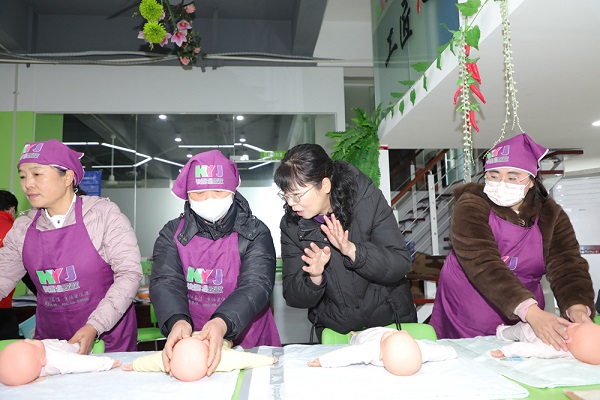Number of migrant workers taking part in NPC continues to grow

Gao Ruihua, a deputy to the 13th NPC, trains employees in baby care skills in Nanjing, Jiangsu province. [Photo/Xinhua]
Fresh data show that a growing number of rural migrant workers have been elected as deputies to the National People's Congress, the country's top legislature.
Drawing on their personal experiences, the national legislators have joined the annual two sessions — the meetings of the NPC and the National Committee of the Chinese People's Political Consultative Conference, the top political advisory body — to voice their desire for more vocational training opportunities and societal respect for their fellow workers.
The data, released by the National Bureau of Statistics on Feb 28, show that China had 295.62 million migrant workers last year, a rise of 1.1 percent from a year earlier. A list of names of deputies to the 14th NPC, released by Xinhua News Agency on Feb 24, shows that this year 56 of them are migrant workers. The number was just three in 2018, when members of the group were first elected to the NPC.
Zou Bin, an award-winning bricklayer from a rural area of Hunan province, was elected as a deputy to the 13th NPC in 2018. He was reelected last month for another five-year term.
He said that he was pleased to see the change as it means that more people are speaking up for the group, and he noted that it is part of China's "whole-process people's democracy".
During Zou's first five years as a lawmaker, the 28-year-old made a slew of suggestions while attending the two sessions.
One of his best-known proposals was that skills-based training should be strengthened for migrant workers, especially for younger people such as himself.
The suggestions were the main driver of a government guideline that was published in 2021 by the employment authorities, which stipulated that training of industrial workers must be improved
"I want to encourage young workers by my example, and I hope to lead them onto the road of serving our country with their skills," said Zou, a quality inspector at the Fifth Bureau of the General Contracting Company of China State Construction Engineering Corp, a State-owned construction company in Hunan.
With both parents working in the construction sector, Zou dropped out of middle school to help them. In time, he became a seasoned construction worker.
In 2015, he was selected as a member of the 32-strong Chinese delegation to the 43rd WorldSkills Competition held in Sao Paulo, Brazil, where the then-19-year-old won a medal for excellence in bricklaying, China's first award in the category.
In the run-up to the competition, he was put through a grueling training program in China, where he learned that the top bricklaying masters must have a good command of geometry and math to lay out complicated patterns.
The experience made him realize the importance of skills and the training opportunities that his father's generation seldom received.
"I am known to, and recognized by, the public because of the competition. Therefore, as a young lawmaker I feel obliged to call for attention to their interests," he said, adding that this is an era in which everyone can make a difference.
Ma Changzhai said that when she became a street sweeper at age 24, she felt so embarrassed that she couldn't look up from the ground. Now, the 39-year-old, who was elected as an NPC deputy last month, said she feels a sense of importance as an "urban beautician".
"However, being a sanitation worker is a laborious task with modest pay," said the cleaner from Shijiazhuang, capital of Hebei province.
As a result of those factors, it has become increasingly difficult to maintain a stable team of workers, and recruit new members.
Ma suggested that the government create a National Cleaners' Day as part of efforts to demonstrate respect for the group, and to help sanitation workers recognize themselves as working in a trade that is "glorious, lofty, grand and beautiful".
"Only when there is sufficient respect for cleaners can the course of sanitation work develop healthily," she said.
- Top legislature schedules standing committee session for late February
- China's top legislator meets with Uruguayan president
- Senior legislator surveys Anhui on formulating outline of provincial 15th Five-Year Plan
- China's top legislator meets with British PM
- NPC deputies see more engagement with top court



